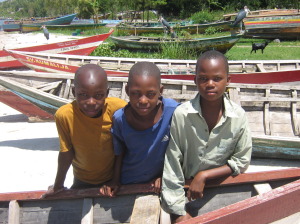Family Support Project
12th June 2019
It is two years since the last Family Support Project update but developments have been well covered on the News page of the website.
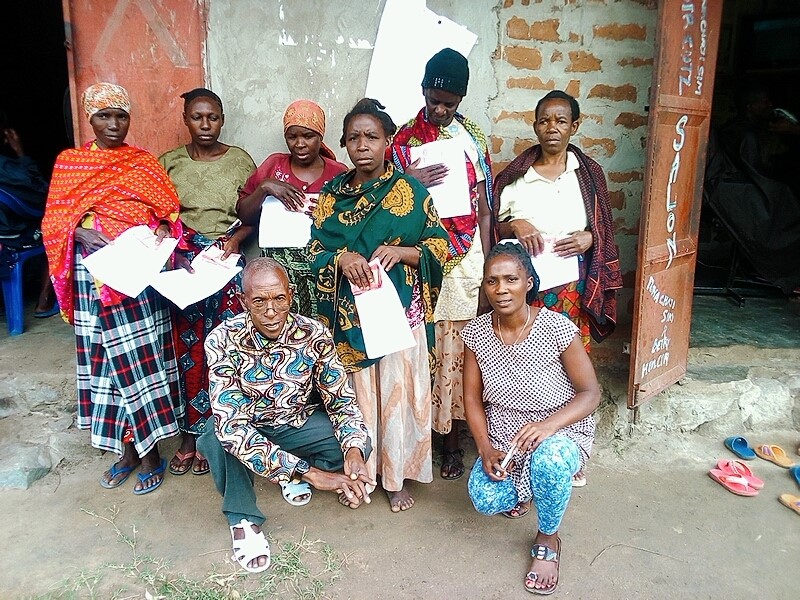 In Igombe, a new group was formed in October 2017 following research by Julieth Godwin, that showed a correlation between business growth and prosperity and the involvement of women in the Tushirikishane group. Access to a vicoba (credit union) adds to economic security. The group new group is called Bujingwa, and included women who had not joined the Tushirikishane group.
In Igombe, a new group was formed in October 2017 following research by Julieth Godwin, that showed a correlation between business growth and prosperity and the involvement of women in the Tushirikishane group. Access to a vicoba (credit union) adds to economic security. The group new group is called Bujingwa, and included women who had not joined the Tushirikishane group.
The main changes in establishing Bujingwa were:
We have not paid health insurance to Karume Hospital. The Tushirikishane women said that they received consultations there, but shortages of drugs meant they were not prepared to pay their own second year premiums. They had to purchase prescribed drugs privately.
We have built in an economic incentive for new entrants to be warmly welcomed into the Bujingwa group. The Tushirikishane group received its vicoba capital payment as a lump sum, so there was a reason not to welcome new women, as this meant more demand on the capital. This was our theory, although never proven.
The structure of the Bujingwa group sees women joining in groups of six. Each woman receives her personal 150,000/- business grant and 25,000/- each is paid into the Bujingwa vicoba, as part of the welcoming ceremony (a total injection of capita each time of 150,000/-).
The figures for capital growth are encouraging. As of 21st January, the 17 women in the group had vicoba capital of 1,562,000/-. This was made up 425,000/- paid by Busega Scotland and 1,137,000/- generated by the women themselves; taking loans and paying back with interest and using the vicoba as a ‘savings bank’. The capital growth was 268%.
The current exchange rate was about 2,900/- per pound.
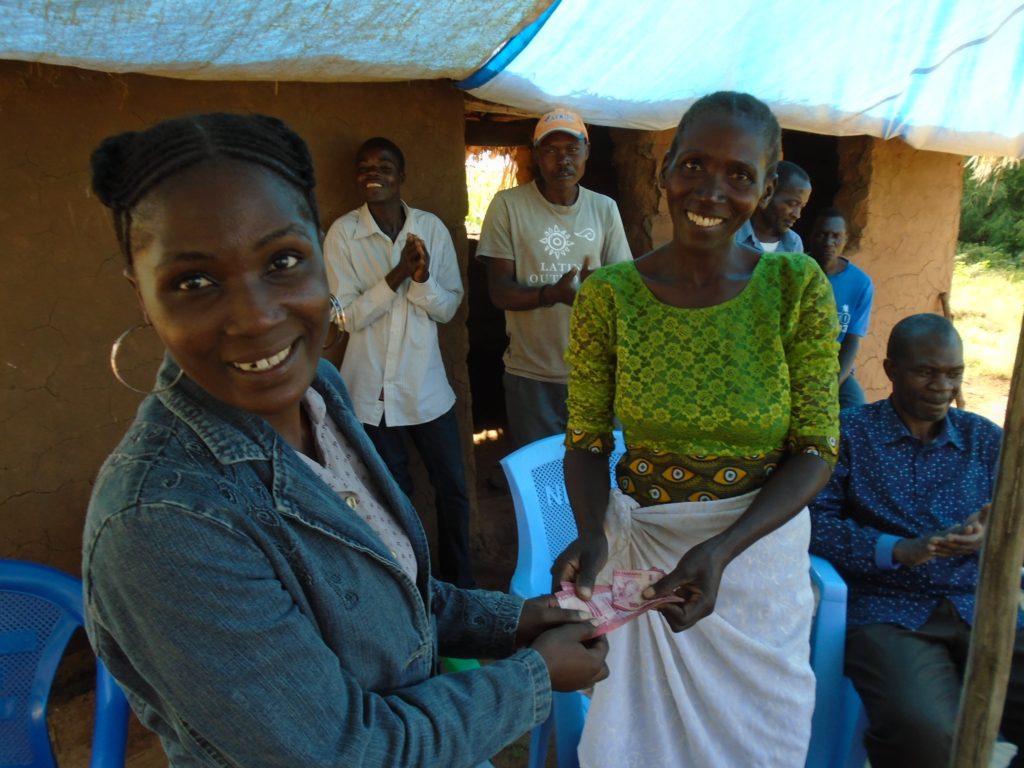 In Chole, there are two women’s groups, both in their second year. A total of 63 women/families have participated. Funding has been provided by Bukumbi Hospital (through subsidising the health insurance), by a Tanzanian NGO CODEHDAF (for health insurance and agricultural inputs), the Goat Race charity in Dar es Salaam (for Group 2 costs) and Busega Scotland (for vicobas, health insurance and health education).
In Chole, there are two women’s groups, both in their second year. A total of 63 women/families have participated. Funding has been provided by Bukumbi Hospital (through subsidising the health insurance), by a Tanzanian NGO CODEHDAF (for health insurance and agricultural inputs), the Goat Race charity in Dar es Salaam (for Group 2 costs) and Busega Scotland (for vicobas, health insurance and health education).
The data provided by the hospital shows that the health insurance scheme has been well used by the Chole families. Comments from the women back this up. The downside has been the costs incurred by the hospital, as the insurance payments don’t balance their expenditure. The hospital has undertaken some accounting work to reduce the deficit and Matron Sr Anastasia Salla said, philosophically, that ‘the costs incurred by the hospital are their contribution to helping the poorest families’. The health screening and education were useful in early identification and treatment of endemic infections.
The vicobas have gone well, with significant increases in capital for both groups. Chole 1 & Chole 2 seem ready to become independent but with contact maintained with the FSP partnership.
There is a Goat Race budget for a women’s conference (likely to occur in November) to include representatives from the Igombe FSP, to share experiences and to learn lessons for the future. In that regard, further groups in Igombe and Chole are being planned.
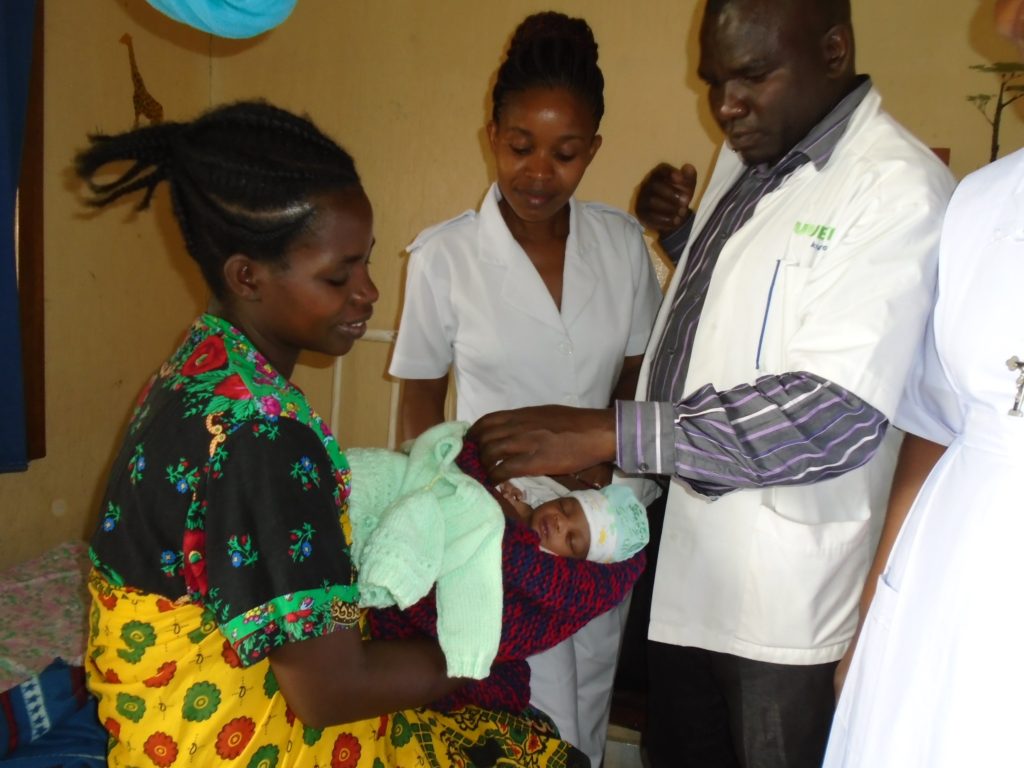
15th May 2017
Important planning has taken place in Mwanza to chart the course of the Busega Scotland Family Support Projects (FSP) at Igombe and Chole. The two projects have important differences, and are at different stages of their development.
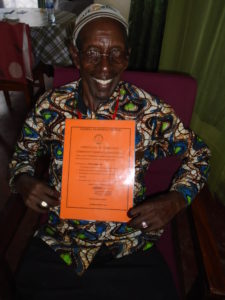
The great news from Igombe is that the FSP Tushirikishane Women’s Group is now a Community Based Organisation (CBO), registered with Ilemela Municipal Council.
The registration is a lengthy process, and cost the group about £100 to achieve, but it allows them to open a bank account and have the possibility for local and central government support. In its constitution the group has 25 founder members but the number will increase as other members join (at present the Family Support Project has provided grants to over 40 families). Going forward the group would like to develop a training plan and maybe start some co-operative businesses, to boost incomes. Alphonce Kagezi, Busega Scotland FSP Supervisor in Igombe, said,
‘I would like to thank Busega Scotland for the help it provides to the poor families. It may seem only small amounts but it helps families overcome other problems in their lives, and in the bible it says, it is always better to give than to receive!’
Busega Scotland is trying to avoid a ‘glass ceiling’ for families in the FSP and help them towards greater financial security. As Mr Kagezi implies, we provide an opportunity that the women have to grasp, but this is not at all easy and is fraught with difficulties. Life for the women in Igombe is, by any measure, hard and uncertain.
We have been speaking to Mr Kagezi about the women who are not in the women’s group and the reasons for that. Our Assistant Project Leader, Julieth Godwin, has also been doing some research into the issue with the women themselves. It is vitally important that group support is available to everyone, as this helps families get over hard times as loans can be made from group funds. The alternative is that women have to use business capital and that can be disastrous. As a result of Julieth’s research some important changes may be made to the project, so that it is strengthened in the light of experience. Busega Scotland is committed to continuously improving its services and challenges arise and have to be overcome on a daily basis.
The project at Chole got off the ground at just the end of last year. It is partnership between a Tanzanian NGO called CODEHDAF, the Chole Women’s Group, Bukumbi Hospital and Busega Scotland. The Chole group is already a registered CBO, with 28 families, and CODEHAF provides inputs for horticultural projects. We will be providing capital for the group of about £375 in total. This allows the women to provide loans to each other as they grow individual businesses. Our second commitment is to provide health insurance for each family for one year, while the families save for subsequent years. We have negotiated a comprehensive service with the local mission hospital at Bukumbi.
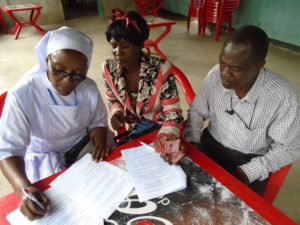
The hospital is one of the oldest in the Lake Zone, having been established by Catholic missionaries in the early 1900’s. It has 150 beds serving 25,000 to 30,000 patients per year.
The insurance, for all services except operations, is costing £7.50 per family per year. In the second year CODEHDAF will pay half the premium and the women the other half, and from the third year onwards the women will become liable for the full costs.
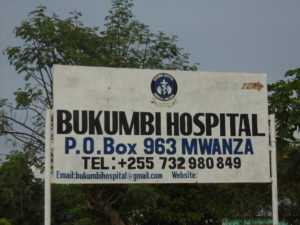
When representatives of the Chole Planning Team, Julieth Godwin and Henry Zepherin (CODEHDAF Field Officer), met the Chole Women’s Group the ladies were delighted with what had been negotiated on their behalf. A project agreement has been signed, with Sister Anastasia Salla the signatory for the hospital.
Julieth has also checked the Chole group’s finances and record keeping. The books are well kept and this has allowed Busega Scotland to pay a second instalment into the group’s capital. The women use the fund as a savings scheme for themselves, as well as taking loans from it. The fund’s total has now reached over 1,000,000/- (£380) and there is still one more Busega Scotland payment to be made.
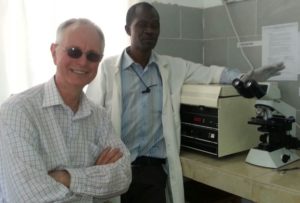 Henry is also the Laboratory Technician at Bukumbi Hospital, having worked there for 25 years. He has strongly advocated community health promotion in Chole, linked to the health insurance scheme. Busega Scotland is planning to work with the hospital in developing the idea, which may include health education, testing and treatment. As Henry said, ‘if the Chole families are tested I am sure that many people will be anaemic through infections with bilharzia, intestinal worms and amoebiasis’. These infections are endemic along the shores of Lake Victoria, can be debilitating to the population and we haven’t even mentioned malaria and HIV!
Henry is also the Laboratory Technician at Bukumbi Hospital, having worked there for 25 years. He has strongly advocated community health promotion in Chole, linked to the health insurance scheme. Busega Scotland is planning to work with the hospital in developing the idea, which may include health education, testing and treatment. As Henry said, ‘if the Chole families are tested I am sure that many people will be anaemic through infections with bilharzia, intestinal worms and amoebiasis’. These infections are endemic along the shores of Lake Victoria, can be debilitating to the population and we haven’t even mentioned malaria and HIV!
If the Chole project is to work to best effect then the women have to healthy to be productive. This is a self-evident but harsh reality of life. It is why Busega Scotland adopts a holistic approach to its projects, while trying to be helpful in a sustainable manner.
If you want to know more about the Busega Scotland Family Support Project, or think you can help in any way, please contact us on [email protected] .
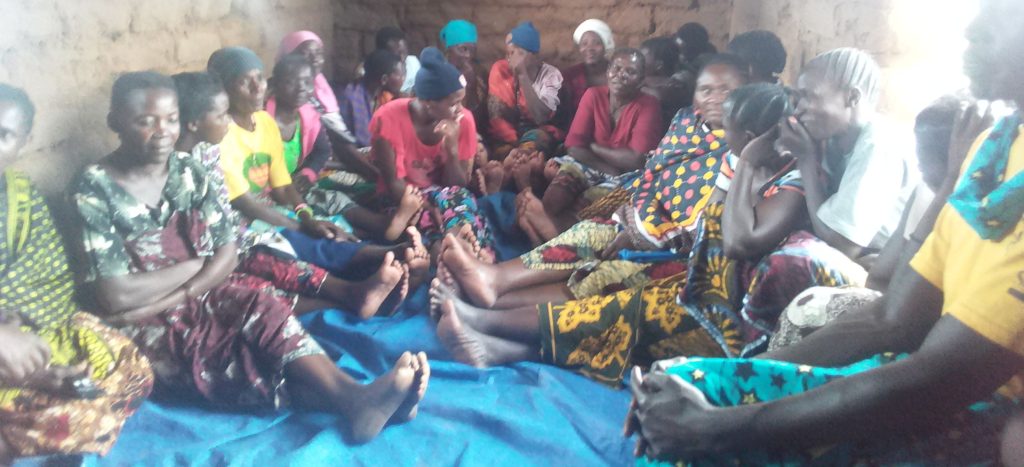
——————————————————————————————————————
August 2016
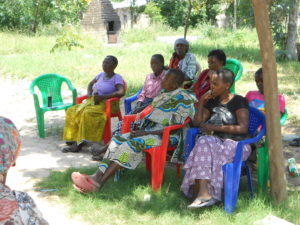 The Family Support Project (FSP) was started by Busega Scotland in Igombe in June 2014. We now work in partnership with a Tanzanian Non-governmental Organisation called HEPOAA (Help Poverty Alleviation Assistance Tanzania).
The Family Support Project (FSP) was started by Busega Scotland in Igombe in June 2014. We now work in partnership with a Tanzanian Non-governmental Organisation called HEPOAA (Help Poverty Alleviation Assistance Tanzania).
Many very vulnerable families in the town cannot take advantage of micro-credit schemes, to establish businesses to generate family income. Businesses will not be large enough to meet loan and interest repayments. Small business is the economic mainstay of the community.
The FSP is managed locally by a Project Supervisor. Its design has depended on a very enthusiastic Steering Group, consisting of the women beneficiaries themselves. The project consists of three connected parts:
- Micro-grants – equivalent to £50 per family that enable businesses to be started.
- Health Insurance – through the local hospital; £9pa covers the whole family.
- Vicoba scheme (like a Credit Union) – women pay in profits themselves from their businesses and take out loans.In its two years of operation the FSP has supported 33 families with 125 children. The evaluation of the project in June 2016 revealed:
-
- Micro-grants had been beneficial to families
- The Health Insurance Scheme had been well used
- The women have supported themselves through difficult challenges and feel more respected as their economic position has improved.Busega Scotland will continue to support the Family Support Project in Igombe and will commence a second project in Chole, supporting women in horticulture.A full evaluation of the FSP can be found on the ‘Reports Page’ of the website and is titled ‘Family Support Project – a cause for celebration’.
- Notes on Igombe
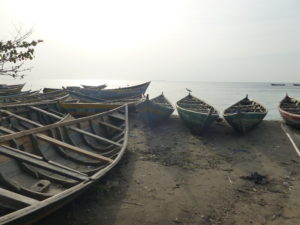
- It is a fishing town with an estimated population of 32,000, having a transitory population of fishermen and road hauliers. HIV/AIDS has had a devastating effect; many families having lost parents, and grandmothers often look after related, and unrelated, children. In late 2015 and early 2016 a cholera outbreak caused further loss of life.
FAMILY SUPPORT PROJECT
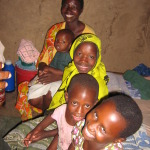 BCDSA TZ established HIV/Aids and Malaria Projects in 2007 and a WAZA Project in 2009. The WAZA Project has supported children from vulnerable families to attend school and the health project offered preventive education and home-based care to victims. The projects have been interrelated but in order to provide a more holistic service they will be combined in 2014 into family support, as we seek to re-focus and expand as a single, integrated project.
BCDSA TZ established HIV/Aids and Malaria Projects in 2007 and a WAZA Project in 2009. The WAZA Project has supported children from vulnerable families to attend school and the health project offered preventive education and home-based care to victims. The projects have been interrelated but in order to provide a more holistic service they will be combined in 2014 into family support, as we seek to re-focus and expand as a single, integrated project.
The ability for children to learn at school is influenced by many factors. Up until now WAZA has provided school fees, uniforms etc. but has not consistently addressed other issues such as the impact of HIV/Aids within the family, general health issues, nutrition and the quality of education and attainment of the children. We feel that without addressing all these issues in a comprehensive manner the life chances of some of our most vulnerable children will not be maximised.
A recent visit to Igombe emphasised the need for an organised, focused and well financed family support project. Igombe is a small fishing town some 25 km west of Mwanza. A recent estimate of vulnerable children put the figure at about 1100. Igombe has suffered greatly from HIV/Aids, as is common with many fishing communities on Lake Victoria. The majority of the five families visited have been affected in one way or another by the disease.
We are indebted to the families for making their difficult circumstances known through this report. Clearly they, and many other members of their community, are in need of additional support to achieve a basic standard of care and education for their children. BCDSA TZ Family Support Project wants to be in the frontline in helping such families with the numerous problems they face.
This willingness to share personal details was backed up by Mr Alphonce Kagezi, the BCDSA TZ Supervisor in Igombe, who is himself HIV+. Mr Kageze was happy for readers to know of his infection so as ‘to caution people from across the world‘. He has committed his life to working with poor families and in tackling the stigma and scourge of HIV/Aids. It is through staff like Mr Kageze, living and working in the community, that BCDSA TZ can make a real difference.
Leya (68 years) is caring for three orphaned grandchildren and two other orphaned children. Only three are able to go to school. She has no one to help her and tries to eke out a living by growing maize and beans on poor land she begs from the community. She has no surplus to sell. One child is HIV + and receives treatment through a home-care project. The family sleep on the earth floor. Leya pays £4 rent per month for their home but now cannot find the money for school uniforms, shoes and exercise books. At £20 for each child it is beyond her means.
Abella lost her husband in a mining accident and works to support her four children by running a small catering business, started through a BCDSA TZ micro-credit loan. 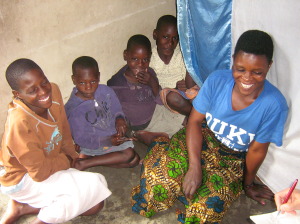 She finds it hard to work and care for the children. Normally the family have just one meal a day. Sometimes Abella fails to find money for food and cannot earn enough for everything the children need to go to school. One child was sent home recently because he did not have shoes. The children are in good health apart from the usual bouts of malaria. Their room is 12ft. x 12ft., divided into a living and sleeping area with a curtain and the family sleep on one mattress under a mosquito net. 3
She finds it hard to work and care for the children. Normally the family have just one meal a day. Sometimes Abella fails to find money for food and cannot earn enough for everything the children need to go to school. One child was sent home recently because he did not have shoes. The children are in good health apart from the usual bouts of malaria. Their room is 12ft. x 12ft., divided into a living and sleeping area with a curtain and the family sleep on one mattress under a mosquito net. 3
Saumu is a 53 year old HIV widow with four of her own children and three other orphans to care for. She has no one to help her support the children. She leaves home at 5 am to go to the lake shore, a 4km walk, to try to get daily labour carrying fish. Sometimes she gets no work. When that happens she has no food for the children. The children are left alone while she is away and she worries that they are not safe.
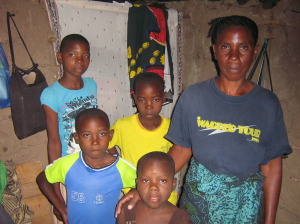 One child is in the WAZA project. The family have one mattress and a mosquito net that the younger children share. The older ones sleep on reed mats. In common with the other families in his report they have no access to proper sanitation.
One child is in the WAZA project. The family have one mattress and a mosquito net that the younger children share. The older ones sleep on reed mats. In common with the other families in his report they have no access to proper sanitation.
Yasmita, 14, and Dina, aged 12, live with their 66 year old widowed grandmother, TABU. The children’s father died in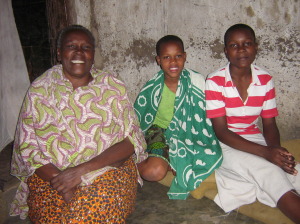 2006 and their HIV+ mother ran away to seek help from a witch doctor. She never returned. The girls are very bright, doing well at school but have been absent due to a lack of exercise books. They needed about £16 for the books and examination fees. A fortune when you have so little. The children share a thin piece of foam to sleep on the floor at night. The warmth of their relationship with each other was very evident. Their disabled grandmother said she was doing all she could to give the girls a good life but she was old and could not work to support them.
2006 and their HIV+ mother ran away to seek help from a witch doctor. She never returned. The girls are very bright, doing well at school but have been absent due to a lack of exercise books. They needed about £16 for the books and examination fees. A fortune when you have so little. The children share a thin piece of foam to sleep on the floor at night. The warmth of their relationship with each other was very evident. Their disabled grandmother said she was doing all she could to give the girls a good life but she was old and could not work to support them.
Margaret is a 39 year old HIV+, AIDS widow with five children. The children have not been tested but one is often sick. The three older ones used to go to school but have not been for over a year, as they have no uniforms or shoes. The family had no food and ate only maize the previous day, provided by a neighbour. Their home is one 8ft. by 6ft. room with no window. The family sleep on a slatted bed base, without a mattress, or on a maize sack on the dirt floor. They have one sheet between them and no other furniture. Margaret rents the room for about £1.60 per month. She used to sell vegetables but this is beyond her now and she is on a course of anti-viral medication. Mr Kagezi, from BCDSA TZ, keeps in touch with the family but has no resources to really help them.
BCDSA TZ has the knowledge, experience and motivation to help the families mentioned in this report but they are not alone in needing our help. In Igombe we would like to work with local leaders, the community welfare officer and citizens, to develop an integrated project that can make a real difference, and become a model for community-based intervention elsewhere. To do this we need sustained and predictable funding, that will allow us to plan for the longer term and avoid families receiving the piecemeal and temporary support so evident in this report.
March 2014.

